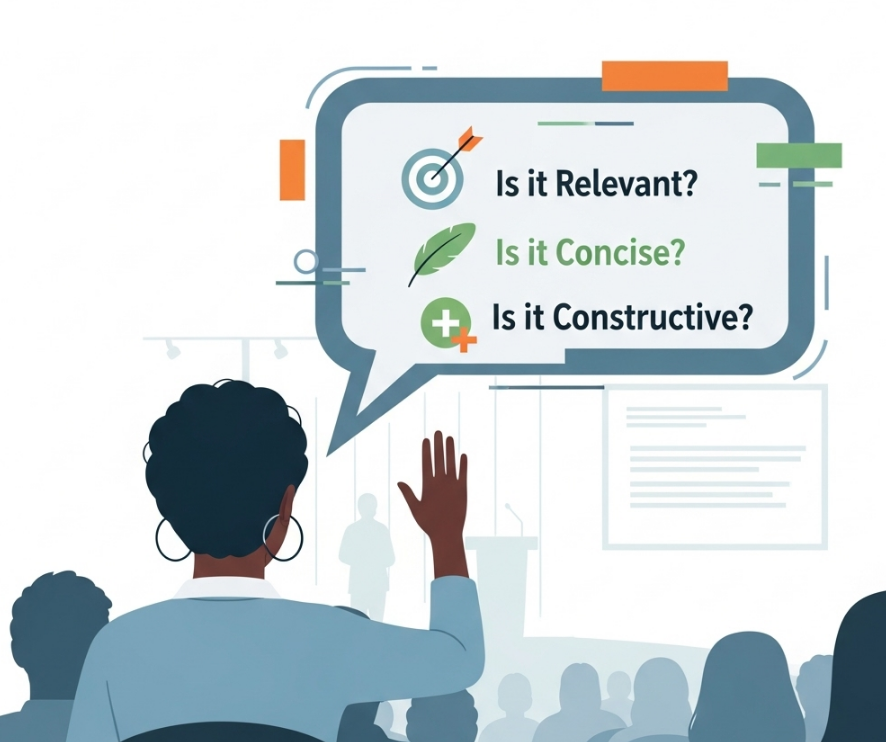

343 views||Release time: Sep 30, 2025
The Q&A session that follows a conference presentation is one of the most dynamic parts of any academic event. It's a live, unscripted dialogue where ideas are clarified, and new connections are forged. For many attendees, especially students and early-career researchers, the thought of raising a hand in a room full of experts can be daunting.

However, asking a good question is a skill that does more than just satisfy your curiosity. It demonstrates your engagement, shows respect for the speaker, and establishes you as a thoughtful member of the academic community. This guide will walk you through the art of formulating and asking a great question.
A good question is born from attentive listening.
Listen Actively: Don't just passively hear the words. Actively listen for the core components of the talk: What is the central research question? What methodology was used? What are the key findings? And, importantly, what are the limitations or unanswered questions?
Take Strategic Notes: As you listen, use a two-column system on your notepad. In one column, jot down the speaker's key points. In the other, write down your own thoughts, confusions, or ideas that spring to mind. This second column is your "question-generation" space.
Formulate Your Question in Advance: Once you have an idea, take a moment to write down the exact question you want to ask. This helps you make it concise and clear, and it prevents you from rambling when you get the microphone.
Not all questions are created equal. A good question is insightful, respectful, and opens up the conversation. Here are a few successful types:
1. The Clarification Question (Shows you were paying attention) This type of question asks the speaker to elaborate on a specific point. It shows you are engaged with the details of their work.
"Thank you for the great talk. Could you please elaborate on why you chose to use statistical model X instead of model Y for your analysis?"
2. The Probing Question (Shows you're thinking about the implications) This question takes the speaker's findings and asks them to look beyond their immediate results.
"That's a fascinating result. Have you considered how your findings might apply in a different context, for example, in the public sector as opposed to the private sector?"
3. The Connecting Question (Shows you're engaged with the conference) This is an advanced move that connects the current talk to another presentation at the same conference.
"Your work on neural networks seems to have an interesting parallel with Dr. Smith's keynote yesterday on data privacy. Have you thought about the privacy implications of your model?"
4. The Forward-Looking Question (Shows you're interested in their work) This is a very respectful and well-received type of question that invites the speaker to share their future plans.
"Based on these compelling findings, what do you see as the most exciting next step or future direction for this line of research?"
State Your Name and Affiliation: When you get the microphone, start with a simple introduction. "Hi, my name is [Your Name] from the [Your University]."
Start with a Compliment: Begin by thanking the speaker. "Thank you for a very insightful presentation."
Keep it Brief and to the Point: A question is not a monologue. Avoid a long preamble about your own research. Ask your question clearly and concisely.
One Question Only: Respect the time of the speaker and other audience members. If you have multiple questions, save them for the coffee break.
Be Constructive, Not Confrontational: Frame your question as a genuine inquiry, not a "gotcha" challenge. Use phrases like, "I was wondering if you could clarify..." or "Could you help me understand..." instead of "But isn't your data flawed because...?"
Conclusion
Asking a thoughtful question at a conference is a win-win. It deepens your own understanding, gives the speaker a valuable opportunity to elaborate on their work, and builds your reputation as an engaged and active researcher. The next time you're in a Q&A session, don't just be a spectator—be a participant.